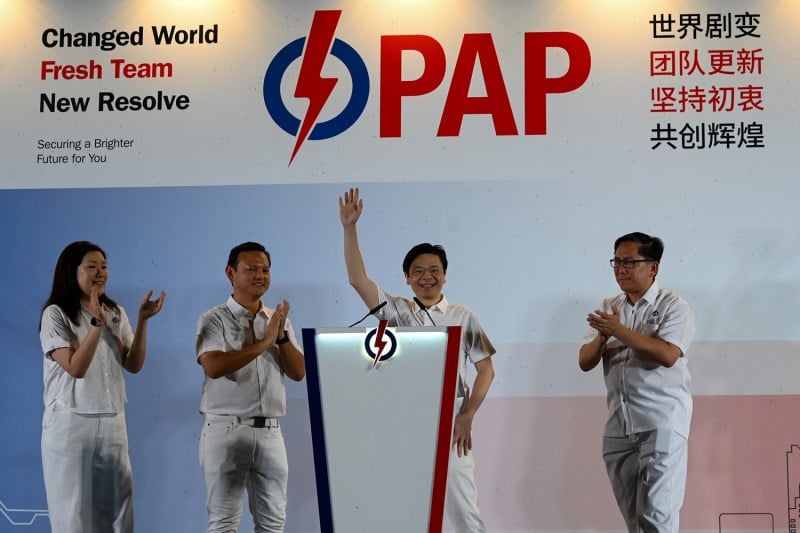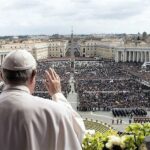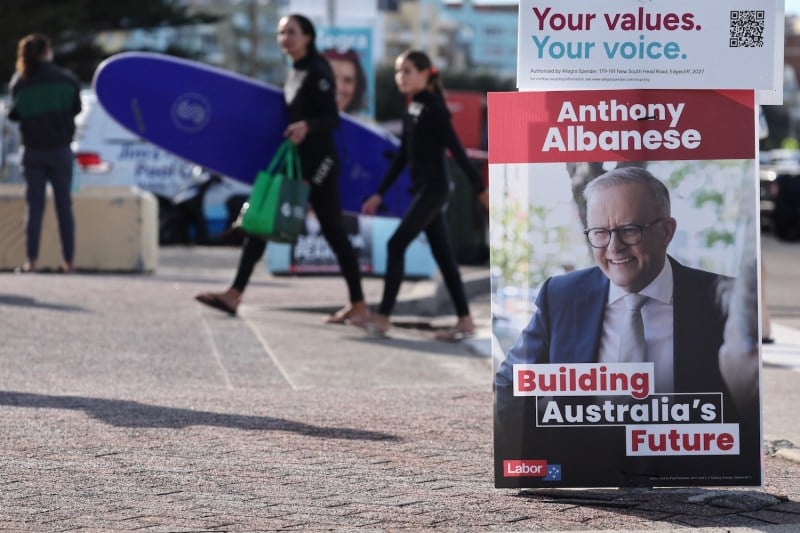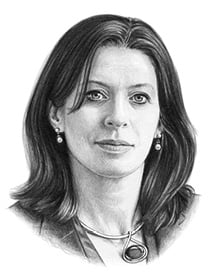Why Singapore’s Ruling Party Won Yet Again

Why Singapore’s Ruling Party Won Yet Again
Voters return Lawrence Wong to power as a steady hand amid a global trade war despite simmering concerns over inequality.
Singaporean Prime Minister Lawrence Wong of the People’s Action Party waves to supporters as he celebrates at the party’s gathering center during general elections in Singapore on May 3. Roslan Rahman/AFP via Getty Images
In the end, it was not even close. Prime Minister Lawrence Wong’s People’s Action Party (PAP), which has ruled Singapore uninterrupted since 1959, improved its vote share by more than 4 percentage points to 65.57 percent, securing victory in a landslide. The PAP maintained its near-total dominance in Parliament, winning 87 of 97 seats, including five of them uncontested. In several constituencies, it secured more than three-quarters of votes polled. Voting is mandatory in Singapore, and the turnout exceeded 90 percent, so its dominance was total.
In the days leading up to the May 3 elections—and Singapore offers one of the shortest windows for campaigning, only nine days—political rallies organized by opposition parties were packed, and enthusiasm for their candidates seemed real. The PAP’s own rallies were poorly attended, even when free food was offered. Social media posts ridiculed PAP leaders for being out of touch with reality, highlighting past insensitive remarks: In 2015, for example, Tan Chuan-Jin, then the minister for family development, said poor older people who collected cardboard boxes to supplement their income were doing so “as a form of exercise.” (Tan resigned from the PAP in 2023 amid personal scandal.) Such comments have reinforced the widely held perception that Singapore’s well-paid politicians are too aloof from how regular people live and inconsiderate about the rising cost of living. Singapore now has more millionaires than does London while median wealth has fallen slightly. The lack of a social safety net also worries public-minded Singaporeans, and a book on the country’s growing inequality was a national best-seller.
In the end, it was not even close. Prime Minister Lawrence Wong’s People’s Action Party (PAP), which has ruled Singapore uninterrupted since 1959, improved its vote share by more than 4 percentage points to 65.57 percent, securing victory in a landslide. The PAP maintained its near-total dominance in Parliament, winning 87 of 97 seats, including five of them uncontested. In several constituencies, it secured more than three-quarters of votes polled. Voting is mandatory in Singapore, and the turnout exceeded 90 percent, so its dominance was total.
In the days leading up to the May 3 elections—and Singapore offers one of the shortest windows for campaigning, only nine days—political rallies organized by opposition parties were packed, and enthusiasm for their candidates seemed real. The PAP’s own rallies were poorly attended, even when free food was offered. Social media posts ridiculed PAP leaders for being out of touch with reality, highlighting past insensitive remarks: In 2015, for example, Tan Chuan-Jin, then the minister for family development, said poor older people who collected cardboard boxes to supplement their income were doing so “as a form of exercise.” (Tan resigned from the PAP in 2023 amid personal scandal.) Such comments have reinforced the widely held perception that Singapore’s well-paid politicians are too aloof from how regular people live and inconsiderate about the rising cost of living. Singapore now has more millionaires than does London while median wealth has fallen slightly. The lack of a social safety net also worries public-minded Singaporeans, and a book on the country’s growing inequality was a national best-seller.
To be fair, the government is aware and in recent years has boosted social spending, given financial respite to those who lost jobs during the COVID-19 pandemic, and made attempts to regain public confidence, but rises in sales tax and expensive housing, exacerbated by foreigners buying and renting property, have increased resentment.
Wong, who will return to power for five years, is a U.S.-trained economist. He had taken over as both PAP leader and prime minister last year, after Lee Hsien Loong stepped aside following two decades in power. Lee is the son of Lee Kuan Yew, Singapore’s founding father, who governed the city-state in its first 31 years.
This year’s election was particularly interesting, as it was the first in decades without a Lee leading the ruling party. (Lee Kuan Yew left office in 1990, and his successor Goh Chok Tong, once described as a seat-warmer before Lee’s son would take over, in fact led for 14 years before Lee Hsien Loong.) Typically, whenever a new leader has taken over the reins, the PAP’s voting share has dropped; Wong bucked that trend.
That is despite the political tumult within Singapore in the last five years. The Lee family was engulfed in a complex melodrama over a dispute about what to do with Lee Kuan Yew’s home. Lee’s dying wish was to demolish the house after his death (so as not to turn it into a monument or museum), and his daughter, Lee Wei Ling, and son Lee Hsien Yang wanted to honor that wish, but Lee Hsien Loong said their father had changed his mind toward the end of his life. The house still stands, Wei Ling died last year, and Hsien Yang has political asylum and lives in exile in Britain, writing articles in foreign newspapers, critical of what has become of his father’s party at the hands of his brother. Days before the election, he wrote in the New York Times: “The party, which has governed uninterrupted since 1959, is no longer living up to its obligations to the people.” While the family drama was engrossing in a voyeuristic sense, the electoral outcome suggests that voters didn’t care.
The resounding vote also shows that even though many Singaporeans on social media felt the best successor to Lee Hsien Loong would have been Tharman Shanmugaratnam, the current president and a brilliant economist and former central banker, Wong’s elevation was eventually a fait accompli. (PAP leaders have said in the past that Chinese-majority Singapore is not ready to have a non-Chinese prime minister; Tharman is of Sri Lankan Tamil origin.)
The last five years had been tumultuous for a republic whose politics is otherwise placid. A former minister was found guilty of corruption; two more ministers faced allegations of questionable practices on a property matter but were cleared; and the controversy over the proposed sale of a union-affiliated insurance company to Allianz compelled the government to block the deal. There have been other scandals, including Tan’s resignation; instances of alleged money laundering and the post-pandemic boom where investors with ties to a money-laundering scandal had got tax breaks; bribery allegations against government-linked or Singapore-based companies over their conduct overseas; sanction-busting; and widening perceptions of crony capitalism.
Amid such tumult, Singaporeans were getting more worried over daily concerns, including disruptions in public transport and flooding, as well as foreign nationals buying local property and taking jobs, inflating the prices of its public housing flats. Singapore is among the most expensive cities in the world to live in.
But while Singaporean voters like someone to rise against the powerful ruling party, they guard their pocketbooks and reward the strict government, which has curbed individual and collective freedoms but made most Singaporeans homeowners and attracted foreign investors to create jobs.
There is a word in Hokkien, the most widely spoken Chinese dialect in Singapore, that means “afraid to lose out”—kiasu. It shows a desperation not to miss out on something by placing your interests first. In practical electoral terms, it means preferring stability over volatility, even if that translates to fewer diverging views in Parliament, however desirable that might seem.
And once again, Singaporean voters placed material interests above broader liberal concerns, even if they may personally think that overseas migrant workers should be treated better, dissidents should not be jailed, or some reasonable criticism of the government should be tolerated. While migrant workers are better paid in Singapore than in other countries, in some instances they live and work in precarious conditions. The PAP continues to sue dissidents and politicians, and the city-state’s stiff defamation laws can bankrupt individuals and websites. Human rights organizations continue to record Singapore’s “benevolent authoritarianism,” and a law against so-called foreign interference hampers civil society. Singapore continues to sue publications for defamation and has a near-perfect record of winning defamation lawsuits against leading publications around the world, including the now-defunct Far Eastern Economic Review, the Wall Street Journal, the International Herald Tribune, and the Economist. A suit is ongoing against Bloomberg. Singapore’s law against what the government describes as fake news places onerous conditions on alternative viewpoints of history and chills open inquiry and free speech.
Since the city-state’s first full elections in 1959, the PAP has pitted candidates with excellent credentials—Oxbridge- or Ivy League-educated scholars, often with stints at large multinationals, or leaders with a mass following—against opposition candidates who included union leaders. Some had had brushes with the law, and their quips, made carelessly, were used against them to describe them as rabble-rousers or inciting racial disharmony, sending some into exile. One crusader, Joshua Jeyaretnam, who shocked the PAP by winning the Anson constituency in 1981 and again in 1984, was repeatedly sued, bankrupted, and hounded from public life. Pragmatic Singaporeans drew their lessons and realized the East Asian saying—the tall bamboo shoot is the first to get cut.
Noting Jeyaretnam’s appeal, Lee Kuan Yew sensed the possibility of individual PAP candidates losing to charismatic opposition politicians and in 1988 introduced group representation constituencies, or GRCs, which require parties to field up to six candidates per constituency as a team, with the stipulation that at least one of the candidates should be from a recognized ethnic minority. This outwardly laudable move was designed to ensure the participation of ethnic minorities in politics. But its effect was that parties could game the system such that weaker candidates hung to the coattails of a strong crowd-puller or minister and could get elected without needing to do much. The GRC math is designed to favor the party that gets more votes: If one party gets 52 percent of the vote and the other gets 48 percent, it is winner takes all, and all seats go to the winning party—a bit like the majority of Electoral College delegate allocation in U.S. presidential elections. As a result, even if opposition parties persistently got between 30 and 40 percent of the vote, their actual seat allocations were low. If GRCs strengthened the PAP, redrawing electoral boundaries further entrenched the party. The opposition has called it gerrymandering, but the government insists that the boundary commission is independent.
Over the years, Singapore’s fledgling opposition gained confidence and began to attract the kind of public-spirited people who would otherwise get drawn to the PAP. Better-educated Singaporeans began to resent the paternalism of the PAP, which wanted the electorate to be grateful for its rule and keep voting it back into power.
What was different this year was that the opposition fielded several excellent candidates whose résumés looked good enough for the PAP to select them. Some had experience that included stints with the Singaporean military and U.S. Navy or at multinational banks, degrees from elite universities, and blemish-free records as professionals, prompting former Prime Minister Lee Hsien Loong to say voters should judge candidates not just by their credentials but the brand of the party.
To be sure, the PAP’s numerical strength apart, the opposition did perform creditably. But the fact remains that the PAP won resoundingly. The main opposition Workers’ Party won just over half the aggregated votes polled in the eight constituencies it contested in against the PAP, and made the PAP earn its votes. Of its 26 candidates, ten were elected, and it lost two seats narrowly. Since Singapore’s rules require at least 12 opposition MPs in Parliament, two of its ‘closest losers’ will get nominated as non-constituency MPs. This does not detract from the PAP’s achievements, but shows how even well-chosen, qualified opposition candidates find it so hard to overcome barriers and ingrained mindsets.
While the looming shadow of U.S. President Donald Trump did not directly affect Singapore’s politics (unlike in Canada and Australia), as a close ally of the United States, Singapore did not want to attract the White House’s attention. Even so, Wong had warned about the devastating effect that U.S. tariffs would have on Singapore. The city-state is a crucial go-between in global trade, a true entrepôt that connects east and west, situated strategically between the Strait of Malacca and the South China Sea. Singapore is primarily reliant on trade for its prosperity, and its port is among the world’s busiest. Its trade-to-GDP ratio is more than 300 percent, substantially higher than the global average.
There is another geostrategic factor: Singapore has maintained good relations with China and the United States over the years; friction between the two has not affected its bilateral ties with either. As relations between Beijing and Washington deteriorate, Singapore recognizes that the impacts can only be adverse. As the African proverb goes, when two elephants fight, the grass suffers. Wong skillfully convinced outwardly oriented Singaporeans who realize the significance of an open economy that tackling tariffs and negotiating U.S.-China tensions are too important to be left in the hands of untried politicians. Thinking pragmatically, listening to their minds and not their hearts, they voted for the PAP.
Salil Tripathi is a writer based in New York. He is the author of The Colonel Who Would Not Repent: The Bangladesh War and Its Unquiet Legacy and The Gujaratis.
More from Foreign Policy
-

A drawn illustration of a Trump whirlwind on a red background Four Explanatory Models for Trump’s Chaos
It’s clear that the second Trump administration is aiming for change—not inertia—in U.S. foreign policy.
-

Marco Rubio is seen up close, sitting on a couch beside J.D. Vance. Marco Rubio’s Soulless Crusade
The U.S. secretary of state stands for no principle other than serving the man who appointed him.
-

Soldiers from various NATO allies take part in a military exercise at the Smardan Training Area in Smardan, Romania, on Feb. 19. America Will Miss Europe’s Dependence When It’s Gone
European self-reliance for security will cost U.S. jobs, profits, and influence.
-

A collage photo illustration shows Donald Trump gesturing with arms wide. In front of him are headshots of Benjamin Netanyahu and Vlodymyr Zelensky, images of immigratns and ICE police, a tattered EU flag and America First signs. Trump’s First 100 Days on the Global Stage
Ten thinkers on what to make of the opening salvo of the president’s second term.











Join the Conversation
Commenting on this and other recent articles is just one benefit of a Foreign Policy subscription.
Already a subscriber?
.
Subscribe
Subscribe
View Comments
Join the Conversation
Join the conversation on this and other recent Foreign Policy articles when you subscribe now.
Subscribe
Subscribe
Not your account?
View Comments
Join the Conversation
Please follow our comment guidelines, stay on topic, and be civil, courteous, and respectful of others’ beliefs.
Change your username |
Log out
Change your username:
CANCEL
Confirm your username to get started.
The default username below has been generated using the first name and last initial on your FP subscriber account. Usernames may be updated at any time and must not contain inappropriate or offensive language.